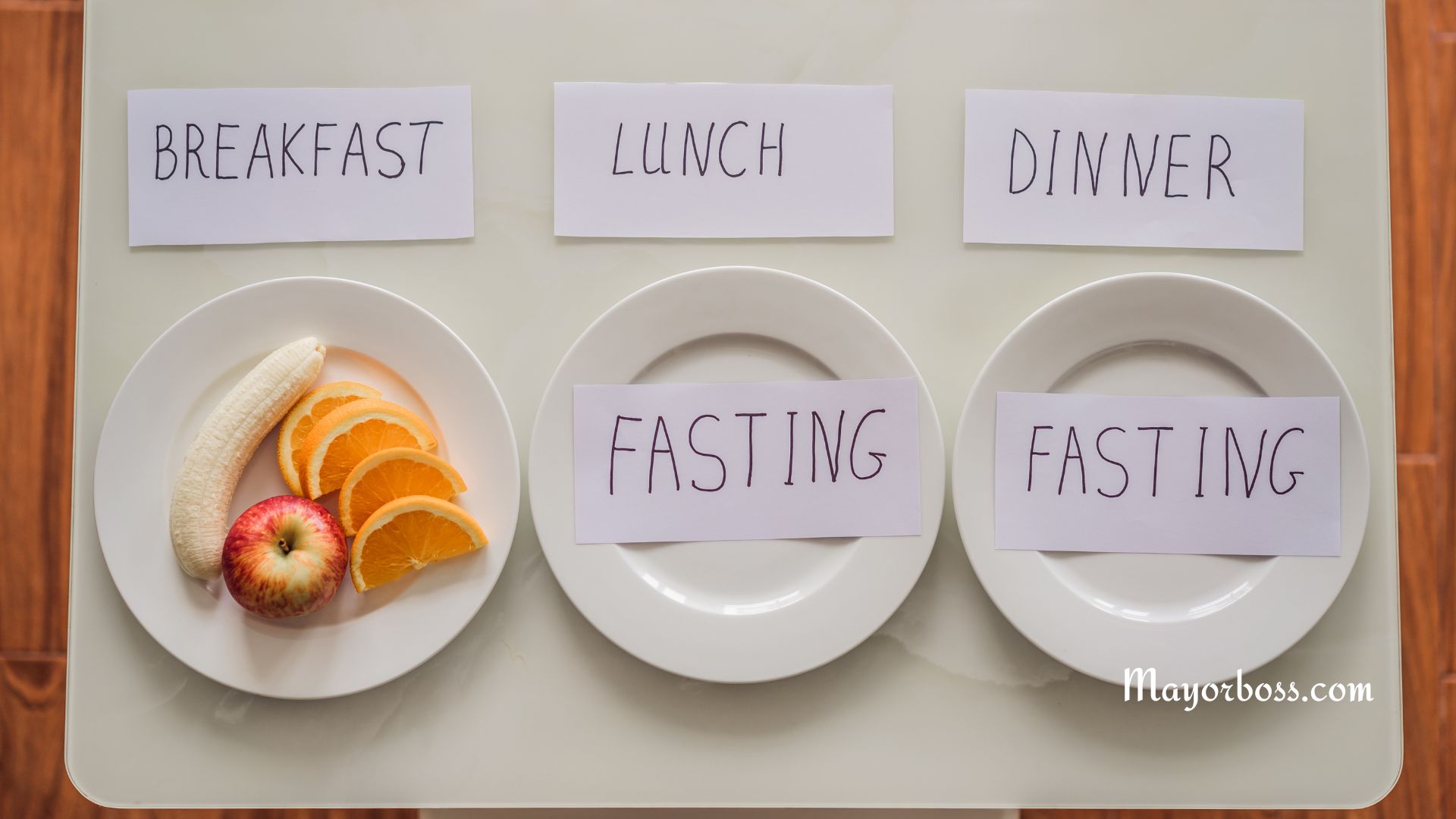What is Intermittent Fasting? Benefits and Tips
Brief Summary: Intermittent fasting is a routine of eating where you circle between periods of eating and fasting. It doesn’t focus on the types of foods you should eat but rather on when you should eat them. Many individuals use intermittent fasting to lose weight. Various methods can be used to do intermittent fasting, and some research suggests it may have benefits for the body and brain and even potential longevity.
What is Intermittent Fasting?
Described in basic terms, intermittent fasting is like a scheduled eating plan. It’s all about eating during certain hours and then not eating, or fasting, for the rest of the time. It’s not about what you eat, but when you eat. You can think of it like a game where you eat during a set window of time and then take a break from eating for a while.

Different Methods of Intermittent Fasting
There are several ways to do intermittent fasting, and you can choose the one that fits your lifestyle best. Here are three popular methods:
The 16/8 Method
Basically, in this method, you fast for 16 hours and eat during an 8-hour window. So if you finish dinner at 8 PM, you won’t eat again until noon the next day.
The 5:2 Diet
The 5:2 diet is you normally eat for five days a week and then eat very little, around 500-600 calories, on two non-consecutive days.
Eat-Stop-Eat
This method involves fasting for a whole 24 hours once or twice a week. It’s a bit more challenging, so it’s not for everyone.
Benefits of Intermittent Fasting
Weight Loss
Are you looking to shed some pounds? Intermittent fasting can help. When you fast, your typical body burns stored fat for energy. This process can aid in weight loss.
Improved Metabolism
Some studies suggest that intermittent fasting can raise your metabolism, helping your body burn fat more efficiently.
Improved Heart Health
According to some studies, intermittent fasting might be good for your heart. It can help lower bad cholesterol and increase good cholesterol, promoting a healthier heart.
Enhanced Brain Function
Some people believe that intermittent fasting can sharpen your mind. Your brain might function better when it’s not constantly processing food.
Improved Skin Health
Intermittent fasting may lead to better skin health as well. By giving your digestive system a break, your body can focus on other repair tasks, including rejuvenating your skin. You might notice a more youthful glow!
Increased Resistance to Disease
Intermittent fasting could boost your body’s ability to fight off diseases. Some experts believe that intermittent fasting may strengthen your immune system, making you more resilient to various illnesses.
Tips for Successful Intermittent Fasting
Here’s how you can make intermittent fasting work for you, focusing on a schedule that fits your lifestyle, eating healthy during eating windows, and listening to your body’s needs.
Start Slow
If you’re new to intermittent fasting, jumping right into a strict routine might be overwhelming. So, start slow. You can begin with a simple fasting window, like 12 hours, and gradually increase it as you get used to the pattern.
Choose a Method That Fits Your Lifestyle
There are different ways to do intermittent fasting, such as the 16/8 method or the 5:2 diet. Pick a method that you can stick to, and that fits your daily routine. For example, if you’re a night owl, you might find the 16/8 method more appealing, where you fast for 16 hours and eat during an 8-hour window.
Focus on Nutrient-Dense Foods
According to health experts, the quality of food you eat during your eating windows is crucial. Aim for nutrient-dense foods that provide vitamins, minerals, and fiber. This means including plenty of vegetables, fruits, whole grains, and lean proteins in your meals.
Avoid Overeating
You might feel hungry after a fasting period, but it’s essential to avoid overeating. Eating too much in one go can make you feel uncomfortable and defeat the purpose of intermittent fasting. Listen to your body and eat until you’re satisfied, not stuffed.
Stay Hydrated
Drinking enough water is vital, especially during fasting periods. You should drink plenty of fluids to stay hydrated and feel energized. Herbal teas or plain water are excellent choices.
Pay Attention to How You Feel
Intermittent fasting is not for everyone. Some people might feel great, while others may experience fatigue or headaches. If you feel unwell, consult a healthcare provider to make sure this approach is suitable for you.
Consider Your Exercise Routine
If you’re an active person, you’ll need to consider how fasting fits into your workout schedule. You might find it more comfortable to exercise during your eating window, or you might need to adjust the intensity of your workouts.
Get Support if Needed
If you find intermittent fasting challenging, getting support from friends, family, or a healthcare provider can be helpful. Sometimes, having someone to share the journey with or getting professional advice can make a big difference in your success.
Things to note
Not Suitable for Everyone
Intermittent fasting might not be the right choice for everyone. Individuals with certain medical conditions or those who are pregnant, breastfeeding, or have a history of eating disorders should consult with a healthcare provider before attempting this eating pattern.
Requires Planning
Success with intermittent fasting often requires careful planning. This includes selecting the right fasting window, planning nutritious meals during eating periods, and aligning the fasting schedule with other daily activities like work and exercise.
Possible Side Effects
Some individuals might experience side effects like hunger, irritability, headaches, or fatigue, especially when starting intermittent fasting. These effects usually diminish as the body adjusts, but it’s vital to monitor how you feel and seek medical advice if needed.
Consistency is Key
Being consistent with your fasting schedule is crucial for success. Randomly changing the fasting and eating windows can disrupt your body’s rhythm and may reduce the effectiveness of intermittent fasting.
Professional Guidance Might Be Helpful
If you’re considering intermittent fasting, especially if you have specific health goals or concerns, seeking professional guidance from a nutritionist or healthcare provider might be a good idea. They can tailor the approach to your individual needs and ensure that it’s safe and effective for you.
Relationship with Exercise
If you’re an athlete or engage in intense physical activities, you’ll need to carefully consider how intermittent fasting aligns with your exercise routine. Proper timing and nutrition can help ensure that you have enough energy for your workouts.
Frequently Asked Questions
Can I Drink Anything During the Fasting Period?
Yes, you can! During the fasting period, you can still drink beverages that don’t contain calories, like water, herbal tea, or black coffee. These drinks won’t break your fast, and they’ll help keep you hydrated.
Will Intermittent Fasting Make Me Feel Weak or Tired?
Some people might feel a little tired or weak when they first start intermittent fasting, especially if they’re not used to it. But many people find that they adjust quickly, and some even report feeling more energetic. If you feel excessively weak or fatigued, it’s a good idea to check with a healthcare provider to make sure everything is okay.
Can I Do Intermittent Fasting if I Have a Medical Condition?
Intermittent fasting isn’t suitable for everyone, especially if you have certain medical conditions or are pregnant. If you have a health condition or take medications, you should talk to your healthcare provider before starting intermittent fasting. They can help you decide if it’s a good fit for you.
What Can I Eat During My Eating Window?
During your eating window, you can eat what you typically would. Intermittent fasting doesn’t restrict the types of food you can eat, only when you eat them. However, choosing nutritious, balanced meals can help you feel your best and support your overall health goals.






